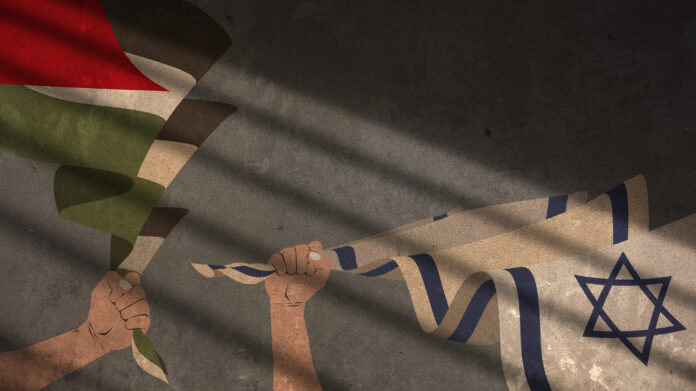
The war between Israel and Hamas forces broke out on Oct. 7th, leaving behind a trail of bloodshed and worldwide objection in its path. This war has initiated discussions regarding proper approaches to address it, but as the conflict continues unfolding, it is increasingly clear that a significant change is necessary to ensure genuine and enduring peace, and to calm the region as the world strives to achieve a stable ceasefire.
Hamas-led Palestinian groups initiated hostilities to begin the war, resulting in repeated violent clashes and considerable loss of life on both sides. The intricate dynamics involved, such as the isolation of the Gaza Strip, unlawful Israeli communities, settler aggression, and intensifications, have generated a split reaction internationally– as well as passionate discussions in media circles. Many advocates and the United Nations are focusing on the imminent danger of starvation and illness spreading as they warn of a serious humanitarian emergency in Gaza.
A Qatari-brokered ceasefire on Nov. 24 temporarily halted active fighting, providing a trace of hope for a peaceful resolution. However, accusations of ceasefire violations on both sides underscore the fragile nature of the truce, raising doubts about the prospects for a lasting peace.
Hamas, designated a terrorist organization by various countries, including the United States, the European Union, and Israel, stands at the center of this conflict. Its history of violence, including suicide bombings and rocket attacks targeting civilians, has led to its condemnation on the global stage. The organization’s anti-Israeli and antisemitic rhetoric, as outlined in its 1988 charter, further solidifies its pariah status.
This brings me to the purpose of my piece. Having looked over this ongoing war since before the events of Oct. 7, I firmly believe that in order to bring about a true and permanent truce, the existence and activities of Hamas must be addressed. It is impossible to regard this brutal, armed terrorist group—which started the war—as a respectable sovereign state. Any genuine and long-lasting peace in the region will require the total removal of Hamas, which the international world must recognize.
It is undeniable that all involved parties have committed multiple atrocities throughout this prolonged conflict. While Israel aims to curb Hamas’ militant activities through decisive action, care must be taken to avoid harming innocent civilians. For true peace to take hold, difficult compromises are required from leadership on both sides. Ultimately, the well-being of ordinary men, women, and children should be the highest priority. Through open communication and a good faith commitment to nonviolence, perhaps the grievances and security concerns of all peoples in the region can begin to be addressed in a sustainable manner.
However, the path to dismantling Hamas is fraught with challenges. Israel’s determination to resume the conflict may encounter challenges, such as the ambiguity surrounding the destination of Gaza’s displaced people in light of Egypt’s unwillingness to admit refugees and Israel’s closed border. Furthermore, it would be very challenging to remove Hamas from power practically. Given Gaza’s dense population and Hamas’s extensive tunnel network, launching a ground invasion there would be difficult and fatally expensive.
U.S. sources claim that the Biden administration encouraged Israel to operate more accurately in the southern Gaza Strip than it did in the northern one, and to avoid “significant further displacement” and serious civilian casualties among Palestinians if it resumes its assault. As per White House protocol, the officials only discussed their remarks under the assumption of anonymity.
The dismantling of the militant group would not only benefit the governing body and citizens of Israel but also the people of Palestine residing in the coastal territory. According to records from NATO, the United Nations, the European Union, the United States, Israel, and several European countries, the organization, and other Palestinian violent factions have intentionally utilized non-combatants as shields. This strategy involves missile deployments, situating military bases in populated sectors, and engaging the Israel Defense Forces (IDF) from or near residential and business districts.
Hamas has stated that civilian losses are both inevitable and beneficial to its objectives. In a 2014 televised interview, for example, a top Hamas spokeswoman stated: “The policy of people confronting the Israeli warplanes with their bare chests in order to protect their homes has proven effective against the occupation… we in Hamas call upon our people to adopt this policy in order to protect the Palestinian homes.”
This demonstrates unequivocally that the group functions with a philosophy that sacrificing the lives of those they lead and fight alongside is worthwhile to ensure the complete destruction of the Jewish people and Israel. This mindset is not that of your average elected administration, but instead that of an organization that uses violence.
The current lull in violence, negotiated with the release of the hostages, offers only temporary reprieve, but the embers of conflict continue to smoke. The reality that a cessation of violence alone is insufficient is a difficult truth the global community must face as the war nears its two-month mark. The full elimination of Hamas is necessary to extinguish the embers permanently and help pave a path for at least a chance at long-lasting peace in the region.
The immediate cessation of hostilities is a positive start, but it is not a cure-all. Global cooperation is key—dismantling extremism in Gaza must be a joint mission, holding all accountable for violence, and recognizing how conflict fuels more conflict. Finding stability demands understanding perspectives from all sides, supporting security needs alongside concern for harm. Navigating this complex geopolitical situation requires striking a balance between support for Israel’s objective to remove Hamas and condemnation of its irresponsible actions. Only through shared efforts to resolve underlying tensions can peace have a chance to take root and grow in this land.
For comments/questions about this story, DM us on Instagram @thewhitatrowan or email thewhit.opinioneditor@gmail.com.





